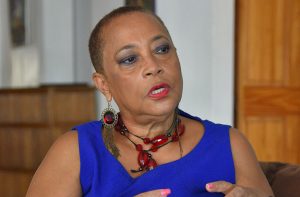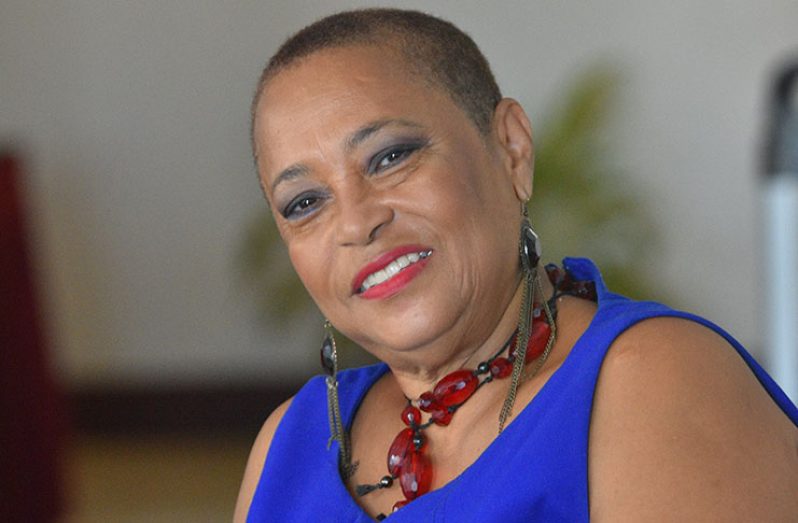Award-winning Guyanese-born journalist, Sherry Ann Dixon tells her story
HOW DOES a young girl growing up in the face of racism and with the loss of loved ones emerge to become an award-winning journalist and one of today’s most sought-after multi-award motivational speakers?
Guyanese-born Sherry Ann Dixon sat down with the Pepperpot Magazine to tell of how she came to interview the likes of Nelson Mandela, Maya Angelo, Luther Vandross and Whitney Houston simply because she learned how to believe in herself.
She has written for publications such as The Guardian, the New York Times and the Washington Observer and has her own consultancy, the Sherry Dixon Consultancy as well as a Marketing and Public Relations company.
In Guyana working on the final touches of her first book, Dixon hopes to teach youths locally and around the world about the power of self-love and self-confidence.
The book will tell the story of how Dixon’s journey took her from Forshaw Street in the bustling capital of Georgetown, all the way to the city of London and how her experiences fashioned her into the woman she is today.
“The book is really an insight to leaving Guyana from the age of 10. My parents put me on a plane and I went on to live in England dealing with the prejudices of growing up in the United Kingdom… it’s also nuggets of the highs and lows of my life as I climbed the ladder so that I can share with other people to say ‘If I can do it, so can you’,” Dixon explained.
Giving us a glimpse of her early life, she said that her parents, desiring a better life for their daughter, arranged for her to move to England to live with her relatives.
However, when Dixon arrived in England in the 1960s she soon realised that while the grass was indeed greener on the other side, her race would be a major game changer to how she was welcomed into the region.
RUDE WELCOME
After World War II, a large influx of immigrants from the Caribbean and elsewhere were welcomed into the British territory with an aim to strengthen the economy which, at the time, was experiencing great labour shortage.
Although the Britons invited the immigrants, Dixon says it was a time where the saying ‘No blacks, no Irish, no dogs’ was a common mantra and Africans and all forms of Caribbean people were living together to support each other.

“Our ancestors were asked to come and work there. When they went there the people didn’t like them. They treated them almost as if they were second-class citizens…I faced challenges as a young girl walking to school where young people would be calling me ‘golliwog’,” she said.
The golliwog is a black skinned, red-lip and frizzy-haired fictional rag doll character created by Florence Kate Upton which appeared in children’s books in the late 19th century.
It later fell out of fashion during the 1960s when it became largely associated with racism.
“As much as in Guyana people talked about light skin and dark skin, there was no such thing as that there. You’re black no matter what shade you are.”
“So all those who grew up thinking they’re ‘better than’ that was certainly not the case when they got to England because you were treated as if you’re not white, if you’re a hint of anything else, you’re coloured,” Dixon told.
BATTLING LOSS
Coupled with these challenges, not long after moving to England, Dixon’s mother died after losing the battle to cancer, a disease the young girl was unaware her mother was struggling with at the time.
“My sister was born of that cancer of the womb and she had leukaemia. So in having leukaemia, she died first and then my mom died a year after so I lost two family members in two years of going to England,” she recounted. “It occurred to me when I started writing the book that when I said ‘bye’ to my mother at the airport, I was actually saying ‘goodbye’, so it was very difficult.”
REMEMBERING WHAT WAS IMPORTANT
But what later led Dixon to where she stands today, was birthed in the positive nature of her grandmother who encouraged her before she left Guyana, to become the best version of herself.
“She was a motivator; she didn’t actually say to me anything negative she would say ‘you can do anything you want to do cause you’re special’, so I grew up with that,” Dixon explained.
When she later obtained her first job as a Legal Secretary, her boss, at the point of his retirement insisted that she follow her childhood passion to become a cosmetologist and even paid for Dixon to study the course.
Soon, the young woman became a top celebrity make-up artist and would learn that through her interaction with the famous people she came into contact with and her inquisitive personality, she was able to experience their opening up to her on a different level.
“The celebrities would ask for me and from being a celebrity make-up artist, while I was interviewing them, I would ask questions because I just had that need to ask a bit more and know a bit more. So, I would ask them ‘what do you read when you’re home?’, ‘what’s on your ipod?’. They felt at ease with me to talk,” she said.
MOVING ON UP
Dixon would later move on to become the editor of Pride Magazine and SHE Caribbean magazine which further propelled her into a life of motivational speaking, encouraging people and groups she realised needed to believe in themselves the same way her grandmother had taught her how to.
Today, one of the top women empowerment speakers in the United Kingdom, Dixon is in Guyana participating in several motivational tours around the country speaking at the National Culture Centre, her past school St. Ambrose Primary, at Bina Hill in collaboration with the Ministry of Indigenous People’s Affairs and more.
Dixon laments that there are not enough positive and youthful motivators in Guyana, and said that more persons need to begin understanding the inner qualities of the people around them rather than lingering on external features.
She says, in the Caribbean region where many are losing their lives to suicide, self-love is even more important than ever before.
Dixon hopes to write more than one book and to create a ripple effect of motivation wherever she goes as persons begin to realise that they do not need the acclamation or approval of someone else to perform at their best.
“My next goal is to create a sea of motivators. Because if I can help you to be a motivator or a mentor, then I can help to bring in another generation of people that will do better because we can’t stay the way that we are.”
Dixon’s book is expected to be released in time for Black History Month which is observed in England in October and will then be released in the United States, Barbados and Guyana by Christmas.



.jpg)








